Content management systems (CMS) will be the platforms that most of the websites online are built on. They supply an administrative backend for site owners to add, edit, and manage all the content that a person sees when they visit that site.
We looked at the most popular options and opted to review WordPress, Drupal, and Joomla, which collectively constitute roughly 60 percent of this share of CMSs on the internet. However, if you’re hosting’training particular’ content such as e-learning or training videos consider a learning management system rather. The businesses below covered the range of content-management options for smaller businesses in terms of features, flexibility, and ease of use.
Greatest CMS For Small Firms: WordPress
We advocate WordPress as the finest CMS for small companies as it offers the best balance of features, flexibility, and simplicity of use. In reality, we believe in it so strongly, it is the CMS we use to power fitsmallbusiness.com.
Visit WordPress
WordPress vs Steam vs Joomla Summary Table
|
|
|
|
|
|---|---|---|---|
| Finest For | Ease of use and flexibility, particularly for news or blog sites | More advanced websites with complicated data firm needs | More content and construction flexibility for users with more technical understanding |
| prices as Reviewed Find Out More |
Free | Free | Free |
| Ease of Setup/Use Learn More |
Easy | Intermediate | Intermediate |
| Benefits |
|
|
|
| Cons |
|
|
|
| Free Themes | 3,000+ | 2,000+ | 1,000+ |
| Free Plugins | 44,000+ | 26,000+ | 5,000+ |
| Average Update Frequency | Each 40 times | Every 30 times | Every 36 times |
| Website | www.Wordpress.com | www.Drupal.com | www.Joomla.com |
Best Total CMS for Smaller Firms: WordPress
We recommend WordPress as the finest CMS for smaller companies due to its range of features, flexibility, and simplicity of use. It’s the best option for novices, is especially well-suited to small and midsize companies, and smaller e-commerce sites. It’s also the world’s most popular content management platform.
For many small companies, WordPress is the best balance between ease of use and flexibility with an emphasis on the former.
Among WordPress’ most noteworthy features is one-click setup, which is offered by most hosting companies. With the support of this feature, even the most novice user can have a basic blog website up and running over 5-10 minutes of registering for a domain name and enrolling in a hosting package. After WordPress is installed, you can pick from among the included themes and begin posting within seconds. Drupal and Joomla both offer one-click setup also, but WordPress is quicker and easier to configure and start once installed.
Of course, you’ll likely want to customize your website to your business’ branding and needs. This is really where WordPress excels over its peers. With more than 3,000 free themes and more than 44,000 free plugins in comparison to 2,000 and 26,000 for Drupal and 1,000 and 5,000 for Joomla, respectively, there is a theme you can accommodate for any aesthetic and a plugin available for almost every need. And those are just the free alternatives.
WordPress has the largest community of users compared to Drupal and Joomla, meaning that service is more accessible and upgrades to themes and plugins are somewhat more frequent.
The downside to WordPress’ popularity is it’s become a more attractive target for hackers and also is far much more prone to attacks and security breaches. WordPress is also known for having a somewhat bloated code foundation, which may negatively impact speed and functionality — but it’s unlikely that the typical small business’ website will be big enough for this to be a problem. Finally, WordPress doesn’t offer multi-language support out of the box — there are plugins which will add this functionality, however it’s not included natively like it is with Drupal and Joomla.
Go to WordPress
Best CMS for Sophisticated Data Organization: Navigation

We advocate Drupal as the best CMS for organizing complex data, whether in articles taxonomies or deploying many sites from 1 code base.
Drupal is much more technically advanced and fully realized than WordPress and Joomla, making it the most appealing option for businesses with dedicated development resources or who outsource this job. It is also possible to edit and access the root files directly in the event that you want to create more significant changes to the code base. It is also less resource-intensive, meaning that it offers better performance with faster loading pages and response times.
Drupal’s recent upgrade to version 8 included some updates that help to enhance the consumer experience for smaller businesses, including:
- Authoring, which is the cornerstone of Drupal’s improved administrator experience. Along with some basic WYSIWYG editor, which can be similar to those offered by WordPress and Joomla, Drupal additionally provides inline and in-context editing directly on the webpage. This is a huge time saver for businesses that handle content on their site — notably easy edits or for people who might not be technically inclined.
- Flexible content delivery enables you to create and deploy content as a support to multiple stations, devices, or software or when you incorporate content from other sources into Drupal. Since APIs become increasingly more prevalent, this will help companies to optimize them.
- Ultimately, translation and localization are easier with Drupal. The CMS natively supports alternatives from the side with dozens of languages. Drupal also can support your business processes around language translation and localization — as an example, integration with external translation service providers.
But some of Drupal’s benefits for some users will be disadvantages to other people — it may be too much for many small businesses to handle. WordPress and Joomla are much easier to use”out of the box” and need less development to set up, manage, and maintain. Drupal also has a steeper learning curve and a smaller community of users, so some companies might need to be resourceful and self-reliant in managing it.
As Brent Wilker, Vice President of Business Development in the leading Drupal development agency, ImageX Media, clarifies:
“Every CMS has utilizes instances which make it a better fit than others, and Drupal is no different. Drupal is considered the premier’enterprise open source CMS’ because of its ability to integrate with other applications and its scalability. Web applications, transactional sites, heavy data collections, large scale processing and significant traffic will find Drupal to be a very effective platform for their needs.”
Stop by Drupal
Best CMS for Content and Structure Flexibility: Joomla

We recommend Joomla as the finest CMS for content and construction flexibility. In addition, it introduces the center ground in understanding between WordPress and Drupal — strong enough to manage complex websites, but does not require as much technical knowledge as Drupal.
Some of the benefits specific to Joomla include:
- Joomla makes it Simple to create social networks within the websites it powers
- Some e-commerce service is included natively, bypassing the need to include and configure third party plugins or modules
- Its administrative interface is the best of their 3 CMSs we examined for managing a large number of posts or construction and editing content constructions
While Joomla does have more of a learning curve compared to WordPress, a relatively minimal investment in time to understand its own architecture and structure will give you a CMS with greater power and flexibility that’s simpler to use than Drupal.
The most significant downside to Joomla is that, despite it being more popular than Drupal, it offers fewer free themes and plugins than both WordPress and Drupal. This means that customization may be more challenging to achieve and maintain than with the other CMSs.
At the same time, while Joomla does contain some basic SEO assistance, it falls short of the features that are included in WordPress and Drupal natively.
Stop by Joomla
In-Depth Review: WordPress vs Drupal vs Joomla
Price
WordPress, Drupal, and Joomla are open source applications, meaning that the bottom product is absolutely free to use and supported by communities of tens of thousands of consumers. Extras which you can add to personalize the base product, such as plugins, themes, and extensions, are offered by third-parties and often at a cost. As well, your site will need to be hosted by a third party hosting company.
Because of this, the true cost of building a website using any of these three applications might vary widely depending upon your specific needs. At the same time, there is no official customer service; all three rely on their own user communities.
Ease of Setup & Use
The primary aim of a CMS is to make it easy for your company to design, construct, and launch your site. A CMS provides an easy interface for you to enter, edit, and manage all the content on your own website and is the platform on which you may add individual plugins and themes to extend and customize its performance to your requirements.
As a result of this, finding the right balance between simplicity of use and versatility will likely be the main factor in determining which CMS is the very best for your small business.
WordPress, Drupal, and Joomla all provide variations of a one-click installation based upon the third party hosting company you choose. Let us look at exactly what you can expect once your CMS is set up.
The post-installation setup procedure for WordPress is considerably quicker and easier than with Drupal or Joomla. Users are presented with a very simple and clean interface with the menus to make posts, pages, or get started customizing the look with themes or functionality with plugins.
On the identical left-hand navigation is a string of links to profile and system setup pages. Rolling on the menu items with your mouse will show a submenu, or you could click on the top-level menu link and navigate through every page. Fields on each page are clearly tagged and prompt you to input basic information about your organization, such as title, tagline, contact info, and societal media links and system settings such as time zones and default URL structure (if you want to change it).
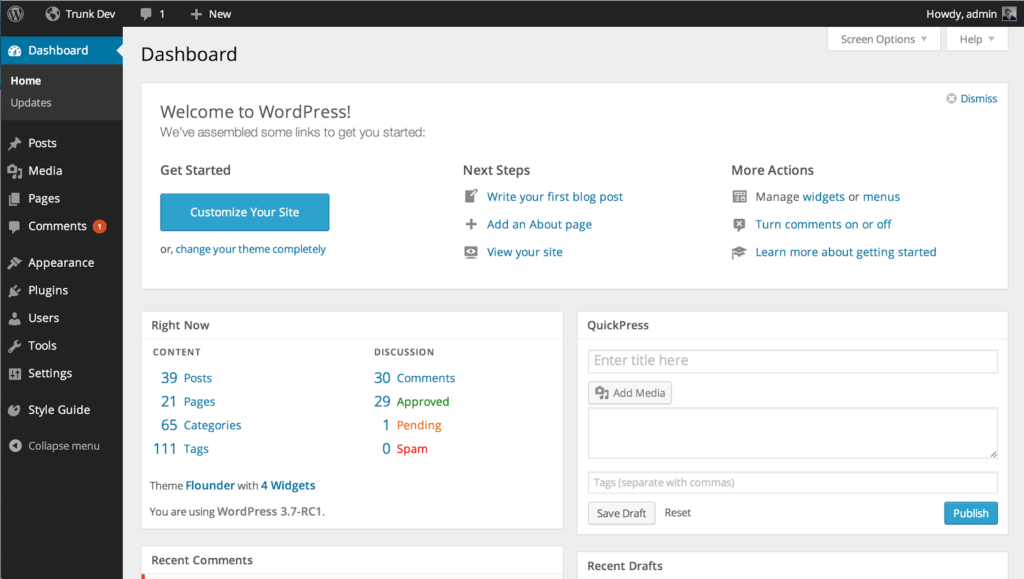
If it sounds intimidating or overly technical, be assured that it is not. Navigation is intuitive, fields are clear, and you won’t be overwhelmed with choices. WordPress’ defaults, although not ideal, will also be enough to establish a simple site for you.
Once your profile and system settings are installed, you can begin to customize the appearance, feel, and performance of your site with plugins and themes. WordPress comes preloaded with several common plugins and themes which you could use as-is or customize with a few fundamental coding knowledge.
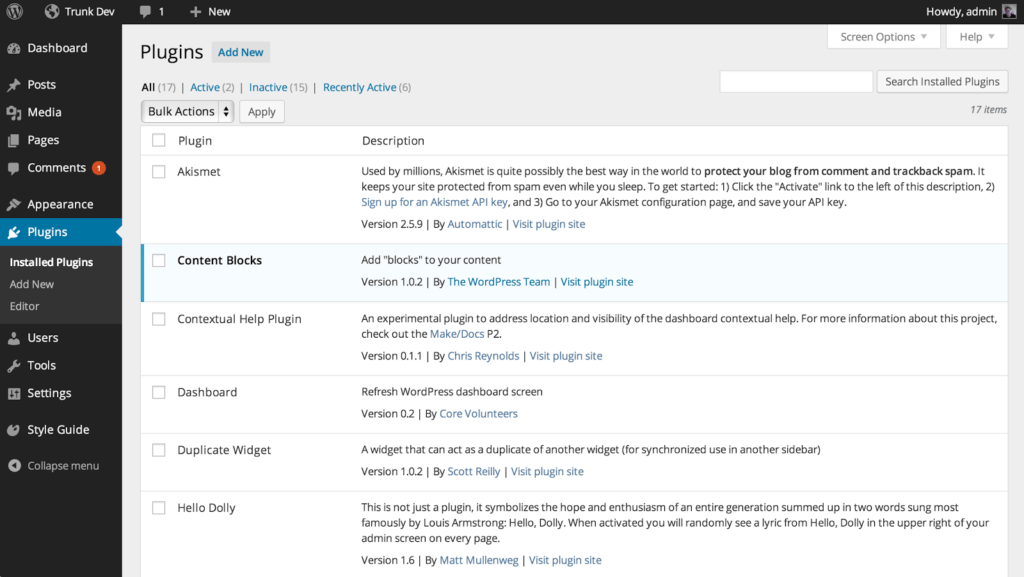
But this benefit can also be among WordPress’ drawbacks. WordPress is an easy to use CMS since it restricts the ability for most users to earn substantial edits to the code. This helps to lessen the danger of malfunction, but in addition, it suggests that you can’t make significant structural changes to your site without the support of a designer or programmer. Drupal and Joomla make it easier for you to create more meaningful modifications to your website, but that comes with all the related risks.
If you would prefer more choice, you can navigate through the thousands of free themes and/or consider paying to get one from third party marketplaces like ThemeForest (which also includes options for Drupal and Joomla( albeit much fewer). Adding plugins to extend the functionality of your site follows a similar procedure.
Of course, there is a good deal to understand about how WordPress works no matter how simple it is to setup and use. This is where the benefit of WordPress’ big user base becomes evident. There are an infinite number of websites devoted to tutorials, from the principles to more advanced topics like enhancing safety. Individual plugins and themes also normally offer their own support too, particularly if you’re using a paid version.
Drupal
Between WordPress, Drupal, and Joomla, Drupal is the most flexible but also the toughest to learn and use. It’s the most robust, complex, and powerful CMS, meaning that it also has the steepest learning curve. If your company wants more than a basic site or small site, it’s very likely you’ll need some technical support and/or development help to make it and integrate the modules that you want to personalize it.
After Drupal is installed, the setup process is not as intuitive and simple compared to with WordPress or Joomla. Drupal does make it rather easy to create and add new content in reality, how it handles complex content is one of its most significant strengths — but basic modifications to the site’s appearance and functionality are less obvious.
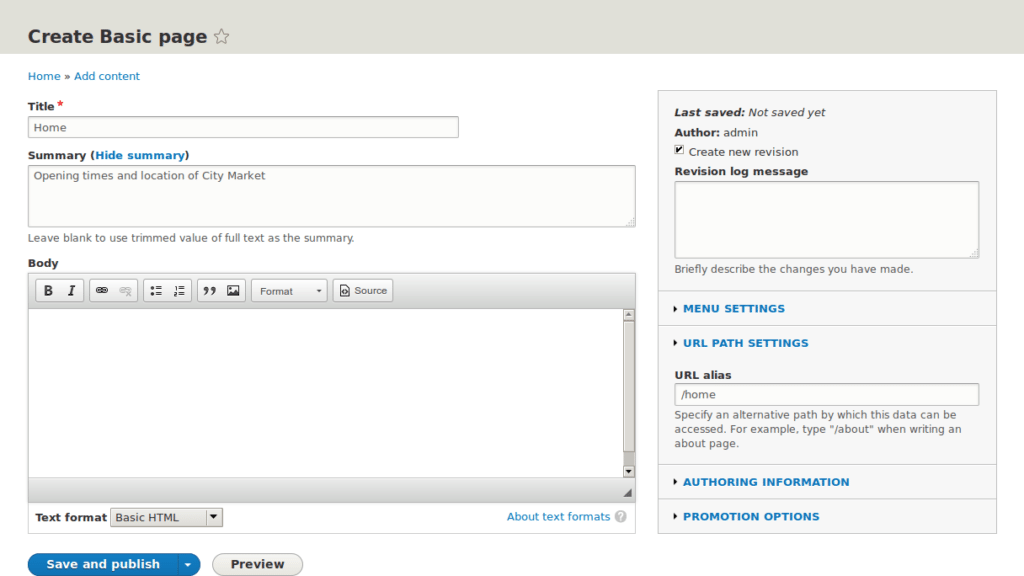
As well, looking for and adding new themes and modules needs one to leave your site’s administration department, including WordPress and Joomla that embed search area within theirs.
If you are considering Drupal as your company’ CMS, it is going to help to get a basic comprehension of HTML, PHP, and other shared website programming languages. You do not need to be an expert, but understanding the basic architecture, hierarchy, and being able to trace through the CMS’ code to make changes can save you a lot of money and time.
Once your website starts to get some traction in the market, developing it will likely require a dedicated programmer (either in-house or outsourcing) to ensure that it continues to carry out smoothly and scales efficiently. This can pose a challenge for many small businesses because Drupal expertise is sometimes tougher and more expensive to find than with a more prevalent CMS such as WordPress.
Joomla
Joomla’s ease of usage falls somewhere in between WordPress and Drupal — less simple, but more flexible, compared to WordPress and easier, but not as flexible or strong, as Drupal. You might presume that this makes Joomla the best balance between ease of use and versatility, but we weigh ease of use more significantly in our evaluation since this is probably the primary concern of most small businesses with limited resources.
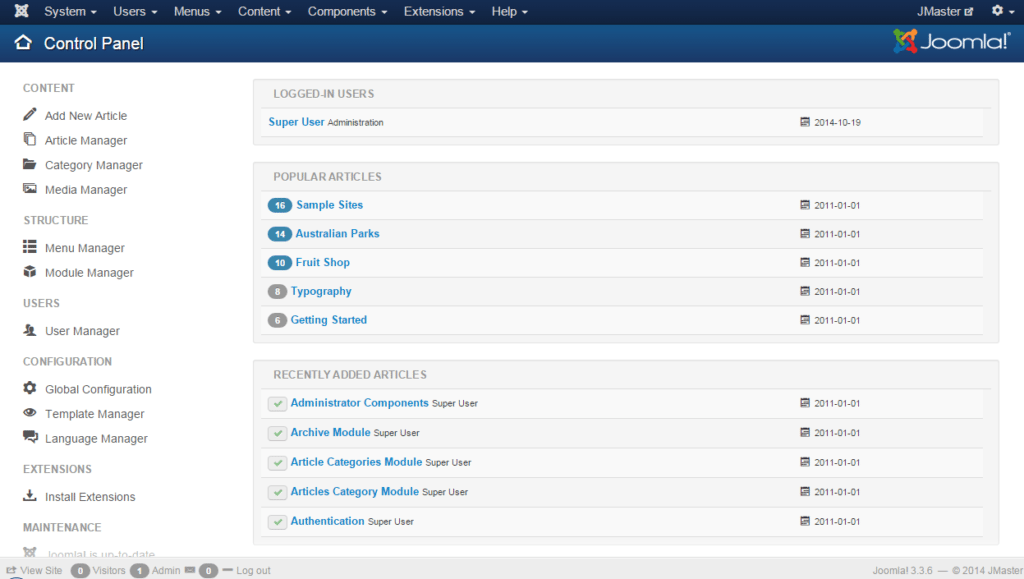
Establishing a basic site is relatively simple, once you understand Joomla’s structure and may browse through its administrative section. Where Joomla excels is that it makes it easy to create user communities, social networks, membership areas, newsrooms, discussion forums, articles, e-commerce sites, or take inputs from external content contributors — all with features that come natively. Additionally, it is simple to make a navigation structure for your website with very little if any knowledge of HTML or other programming languages.
However, the downside to its flexibility is that the administrative section is narrowed by many options, menus, and submenus and can be overpowering for novice users. It does not require the technical understanding of Drupal, but it is not nearly as intuitive as WordPress.
Characteristics & Integrations
First, it helps to clarify what WordPress, Drupal, and Joomla have in common. They are all open source software, which means that their base code is distributed at no cost and they are supported by their various communities of users. They are all written primarily in PHP and support MySQL as their database management system. And they all use themes as the templates to the visual appearance of their websites and plugins, widgets, modules, or extensions for expanding their features.
While they have these similarities, there are many differences which directly affect the users interact with them to build their sites and what they are each especially adept at.
WordPress
WordPress’ main feature is its ease of use. While this doesn’t necessarily refer to some particular part of the CMS, the general user experience and learning curve will directly influence the CMS’ usefulness for your business. The time spent learning how to use the CMS, the quicker your site can be started to support your business. At the same time, you are more inclined to customize it to your requirements and take advantage of WordPress’ other capabilities.
WordPress’ big and active community of users is its additional distinguishing feature. As an open source CMS, developments to the program and ongoing support rely on people who use it and decide to contribute. WordPress delivers many more free themes and plugins compared to Drupal and Joomla and this is made possible due to its popularity.
In the end, WordPress includes many SEO best practices out of the box such as favorable URL structures, simple to upgrade metadata, and automatically generated XML sitemaps. Most themes are also fully responsive, which directly affects how Google ranks your site.
Drupal
Drupal’s primary features normally stem from the fact that it is the most technically advanced CMS of those that we reviewed.
The first feature is the fact that it is the most capable of handling complex data business and taxonomies. Its code base is lean, stable, and provides exceptional performance and reaction times. This makes it the most acceptable alternative for scalability, so in the event that you expect the requirements put on your website to grow rapidly, then Drupal may be your most efficient and economical CMS over the long run.
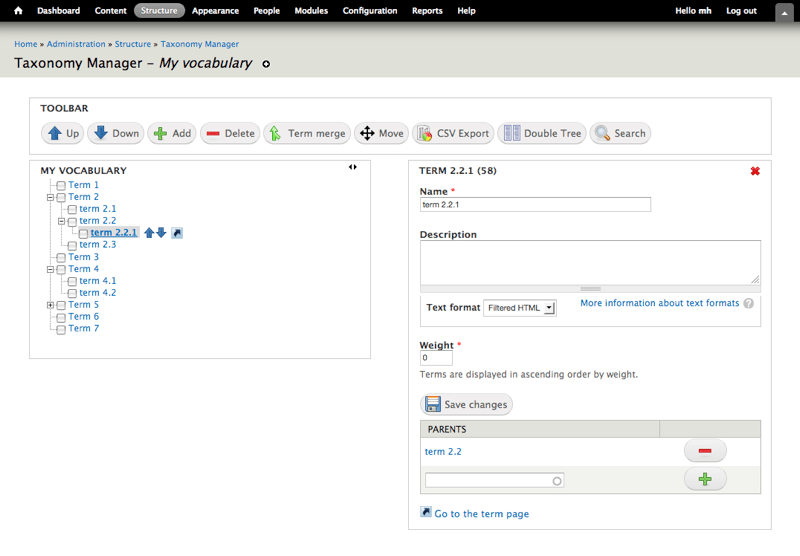
You can also deploy many sites from the exact same Drupal code base. A good illustration of this I have worked on in the past is a university’s site. Every school, department, and program at the university had their own website, but they were all based on precisely the same foundation routing installation. This generated many efficiencies of scale regardless of the bigger up-front investment. Neither WordPress nor Joomla can offer a similar option.
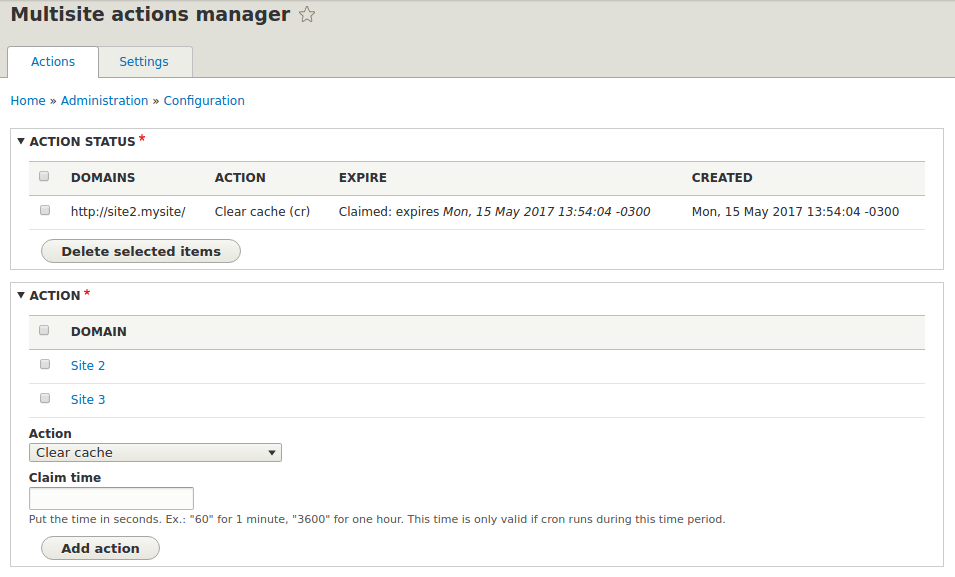
Ultimately, Drupal is the most flexible and customizable CMS of those we examined — assuming you have the technical knowledge, or have hired a programmer who does. This opens up many possibilities for your Drupal-based site, if you are willing and able to incur the associated costs.
Joomla
Joomla’s primary features are built around its capacity to efficiently manage large quantities of information and that it excels in structure and content flexibility. In reality, Joomla is designed to perform best as a community platform with strong social media features.
Because of this, Joomla is the best of this CMSs we reviewed at handling data-intensive and social programs such as:
- User communities
- Social networks
- Membership areas
- Discussion forums
- E-commerce websites
- Accepting inputs from outside content contributors
Support for each these programs is included natively with Joomla — you do not need to look for, audition, and configure third-party plugins or modules just like you do with WordPress or Drupal.
Client Service
Because WordPress, Drupal, and Joomla are open source applications, they are supported by their own communities of consumers — maybe not a centralized business with a support centre. WordPress has the biggest user base, and so it has the largest support base; Drupal is next, followed by Joomla.
The developers of individual topics, plugins, and modules will often offer support to their particular goods, especially for compensated versions.
WordPress, Drupal, and Joomla also all offer user documentation in their own websites, each preserved by their respective communities.
All CMS Options for Small Businesses
We recognize that there are many CMS options out there, and here’s a look at the best of some of our research from around the web:
| Software Name | Overview |
|---|---|
| WordPress | Best complete CMS for small businesses |
| Drupal | Best CMS for complex data and scalability |
| Joomla | contrasts between simplicity of use and flexibility |
| Shopify | Finest for most small company e-commerce websites |
| Magento | Another e-commerce choice great for enterprise-level websites |
| Squarespace | Easiest CMS to build a quick templated Site |
| Wix | Customize your website using a drag and drop interface |
Bottom Line: Best Content Management System
WordPress, Drupal, and Joomla are all excellent CMS options with their own distinct attributes and use cases. Choosing the best CMS for your company will come right down to ease of use and flexibility — no two companies or sites are exactly the same, so there is not any universal reply to the question.
WordPress is the easiest to use from the box, gets the most free themes and plugins, and contains the largest community of consumers. However, its code base can be a bit bloated and prone to hacking or other security breaches.
Drupal offers the maximum flexibility and scalability, manages complex data with ease, and can be deployed across multiple websites from one code base. But, it has the steepest learning curve and requires more technical knowledge to use.
Joomla’s administrative user experience is the best for websites with a great deal of data or content along with the platform balances ease of use with flexibility. But, it offers the fewest free plugins and themes also lacks anything more than basic SEO friendliness.
That said, we recommend WordPress as the best CMS for small companies because of its balance between simplicity of use and versatility as well as its large and active community of users.
Visit WordPress

